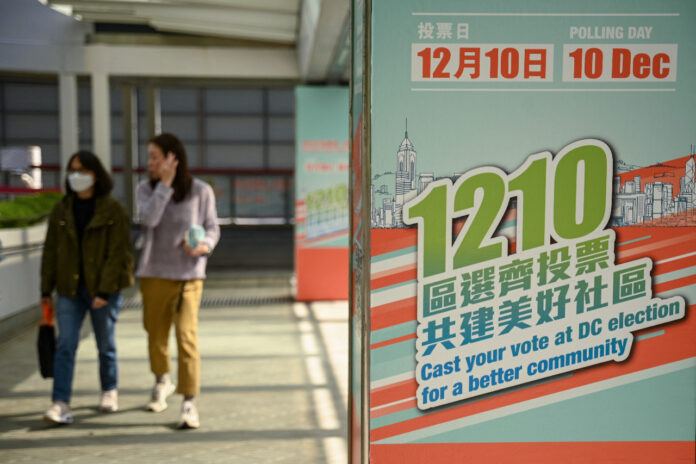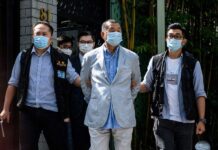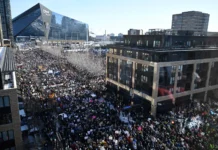
Results expose unpopularity of authoritarian rulers
Hong Kong held its “election” for new district councils on 10 December, with a final voter turnout of just 27.5 percent. This is the lowest voting rate since the first district councils were set up in 1982 (under British rule).
In the previous district council elections, the turnout was 71.2 percent. That was in 2019, in the final weeks of the millions-strong mass struggle against authoritarian rule that shook the territory for more than half a year. The latest turnout is even lower than the 30.2 percent who voted in the 2021 ‘patriots-only’ legislative elections.
Both the district councils and the Legislative Council have been ‘reformed’ under orders from Beijing to eliminate the possibility of any opposition candidates taking part. The counterrevolution that followed the defeat of the 2019 movement has seen Hong Kong’s limited and partial bourgeois democratic system replaced by a fully-authoritarian model. The 10 December results show that public resentment towards the Chinese dictatorship (CCP) and its local puppets continues to deepen.
Only 1,193,000 people voted, which is even fewer than the votes received by the pro-CCP camp in 2019 (1,210,000). This indicates that since the enactment of the National Security Law in June 2020, the CCP’s support in Hong Kong has not expanded. Instead, even its previous base of support is now flagging. The biggest pro-CCP party, the DAB, lost 200,000 votes compared to its performance in the 2021 Legislative Council election.
Voting extended to midnight
In 2019, in the face of the mass movement demanding free elections, an end to police brutality and dropping of charges against protesters, the pro-CCP camp suffered a crushing defeat in the district elections. Subsequently, Beijing ordered a complete overhaul. Of the original 452 directly elected seats, only 88 remain (the remaining 382 seats are appointed). The nomination threshold was also raised, requiring national security screening to ensure only pro-CCP “patriots” can stand for election. The space for political discussion in the previously powerless district councils was eliminated.
It is clear that rather than public “indifference”, these elections met with a deliberate boycott by the vast majority of the population, even though it is illegal to organize or advocate for a boycott. Hong Kongers took “lying flat” to a new level.
In order to stimulate voter turnout and demonstrate Hong Kong people’s “acceptance” of the new system, the CCP and the Hong Kong government spared no effort. A bizarre “District Election Fun Day” was staged, with a huge concert involving almost 100 artists. The government for the first time subsidized elderly homes to provide transportation for elderly voters.
In the late afternoon on election day, as the poor turnout became clear, the Chinese regime issued a “deadly order” to the Hong Kong government, demanding it secure a minimum voter turnout of at least 30 percent. The Hong Kong government then announced a “computer system failure” and unprecedentedly extended the voting time by an hour and a half until midnight. But to no avail.
Repression intensifies
The CCP dictatorship will of course not change its stance based on these election results. Xi Jinping’s unrelenting counterrevolutionary crackdown in Hong Kong continues unabated. Over the past year, repressive measures in Hong Kong have deepened. Chief Secretary John Lee has announced his intention to enact ‘Article 23’, a local and more rigorous national security law by 2024. As of mid-2023, at least 260 people have been arrested under Beijing’s National Security Law, which carries a maximum penalty of life imprisonment. In addition, more than 10,000 Hongkongers have been arrested in connection with the 2019 movement and nearly 3,000 prosecuted. 517 of those prosecuted were minors.
The trial of the “47 pan-democrats”, the largest single case under the National Security Law, has just concluded. The court is expected to deliver its verdict within the next three months. It is anticipated that most defendants will be found guilty, and those who have pleaded not guilty (such as left-winger ‘Long Hair’ Leung Kwok-hung) are likely to receive lengthy prison sentences.
Despite increased repression and a raft of new authoritarian measures in China and Hong Kong, the rule of the CCP dictatorship is less secure now than three years ago. It is caught in multiple crises and intensifying internal power struggles. The result is that Xi Jinping is even more reluctant to soften his stance. A clear anti-Xi mood is growing in Chinese society and more and more especially young people are beginning to understand the reasons for the mass protests in Hong Kong. The future struggle for democratic rights in Hong Kong and in China will need to build cross-border links and solidarity, and build an organised working class movement against capitalism as the most important ingredient to defeat the billionaire CCP dictatorship.
This article has been translated from Chinese and edited for the benefit of overseas readers



